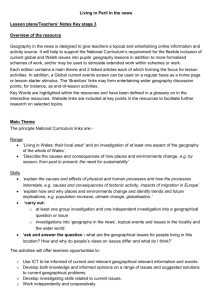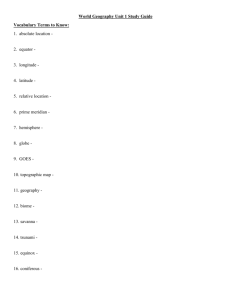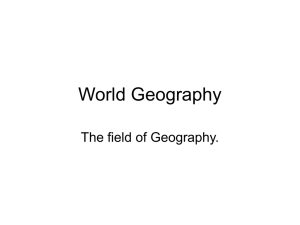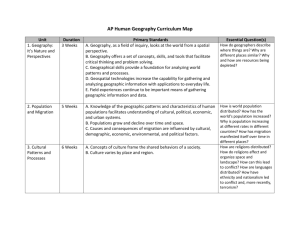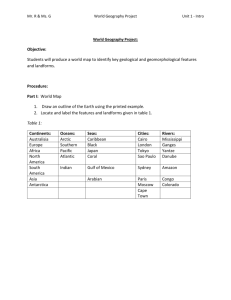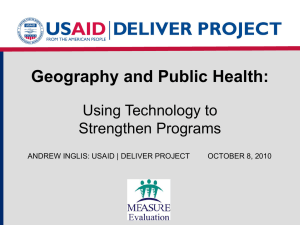Classroom Activities KS2
advertisement
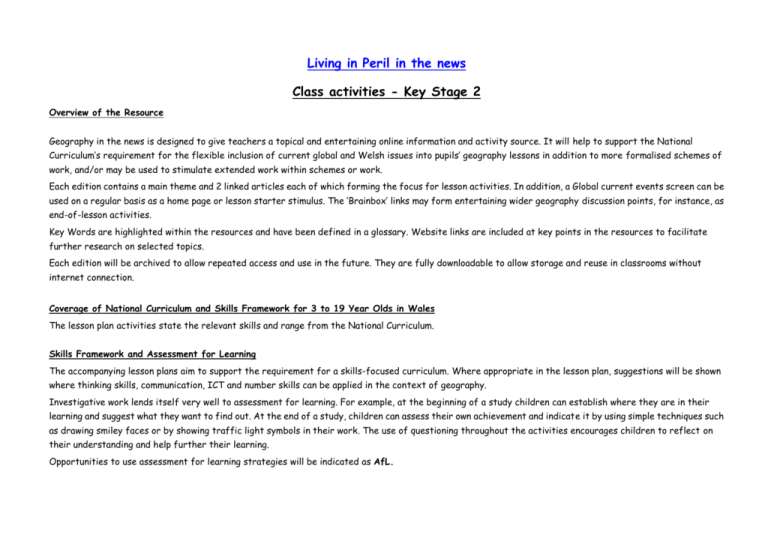
Living in Peril in the news Class activities - Key Stage 2 Overview of the Resource Geography in the news is designed to give teachers a topical and entertaining online information and activity source. It will help to support the National Curriculum’s requirement for the flexible inclusion of current global and Welsh issues into pupils’ geography lessons in addition to more formalised schemes of work, and/or may be used to stimulate extended work within schemes or work. Each edition contains a main theme and 2 linked articles each of which forming the focus for lesson activities. In addition, a Global current events screen can be used on a regular basis as a home page or lesson starter stimulus. The ‘Brainbox’ links may form entertaining wider geography discussion points, for instance, as end-of-lesson activities. Key Words are highlighted within the resources and have been defined in a glossary. Website links are included at key points in the resources to facilitate further research on selected topics. Each edition will be archived to allow repeated access and use in the future. They are fully downloadable to allow storage and reuse in classrooms without internet connection. Coverage of National Curriculum and Skills Framework for 3 to 19 Year Olds in Wales The lesson plan activities state the relevant skills and range from the National Curriculum. Skills Framework and Assessment for Learning The accompanying lesson plans aim to support the requirement for a skills-focused curriculum. Where appropriate in the lesson plan, suggestions will be shown where thinking skills, communication, ICT and number skills can be applied in the context of geography. Investigative work lends itself very well to assessment for learning. For example, at the beginning of a study children can establish where they are in their learning and suggest what they want to find out. At the end of a study, children can assess their own achievement and indicate it by using simple techniques such as drawing smiley faces or by showing traffic light symbols in their work. The use of questioning throughout the activities encourages children to reflect on their understanding and help further their learning. Opportunities to use assessment for learning strategies will be indicated as AfL. Article 1: Danger – Limestone! Key Skills Objectives Subject Objectives and Skills Activities and Resources Thinking Skills Geography Aim: to gather information about limestone environments Plan Skills Ask questions Investigating: Gather information Determining success criteria Resources: – observe and ask questions about a geographical issue “limestone dissolution” experiment - measure, collect and record data through Develop Forming opinions and making decisions cups, water, sand and bicarbonate of soda for a short books and internet access for research carrying out practical investigations - organise and analyse evidence and draw conclusions Activity 1 – Understand limestone dissolution. Stir bicarbonate of soda into water in one cup, and sand into Reflect Communicating: water in another cup. Review outcomes and success criteria - express their own opinions Report to the class what happens Evaluate own learning and thinking. - communicate findings in a variety of ways Teacher to explain that some substances (like limestone) dissolve in water while others do not. Number Range Gathering information Carry out investigations of ‘geography in the Activity 2 – Write a short report about a feature of limestone Recording and interpreting data and news’. landscapes. presenting findings. Develop their geographical skills, knowledge Work in pairs and understanding through learning about Use books and online resources to research one of the Communications places, environments and issues globally Literacy Presenting information and ideas limestone features in the interactive guide. Geography vocabulary: Include at least one picture, preferably drawn by hand, to illustrate. Limestone, karst topography, sinkhole, Wider Communiations gorge, erosion, ecosystems, environmental, AfL: Pairs to hand in work for marking subterranean Communicating information. Reflect: Read teachers comments and rewrite one or two sentences using the suggestions given for improvement. Article 2: Danger – Volcano! Key Skills Objectives Subject Objectives and Skills Activities and Resources Thinking Skills Geography Aim: To gather and use information about volcanoes and their Plan Skills hazards. Asking questions. Investigating: Gather information – observe and ask questions about a Resources: geographical issue Develop - develop ideas to find answers and draw Article 2: Danger – Volcano!. Books and online sources. Forming opinions conclusions Develop ideas Communicating: Activity – Find out about one of the dangers mentioned in the Thinking about cause and effect and - express their own opinions interactive guide to volcanoes (This activity may take one or more making inferences. - communicate findings in a variety of ways lessons to complete) Working in small groups (2/3) choose one of the hazards of Range volcanoes (lava or mud flows, lava bombs, pyroclastic flows or Reflect Carry out investigations of ‘geography in the ash clouds) Evaluate own learning and thinking. news’. Prepare a short presentation for the class to explain: Develop their geographical skills, knowledge Why they happen. Communications and understanding through learning about How it might affect the local environment and population. Literacy places, environments and issues nationally and Presenting information and ideas. globally AfL: Groups to present to the class, with an opportunity for the class to ask questions at the end (teacher-led) Wider Communication Skills Vocabulary: Communicating information Shield and composite volcano, lava, magma, crater, caldera, pyroclastic flow, ash cloud, mantle, core, crust, tectonic plates Article 3: Living in Peril Key Skills Objectives Subject Objectives and Skills Activities and Resources Thinking Skills Geography Aim: To bring together the information and concepts from this Skills issue of Geography in the News in order to design a sustainable Plan Gather information man-made environment (city or school building) Asking questions Consider evidence Gathering information Develop ideas to find answers and own draw Resources:: conclusions Develop The articles ‘Danger – Limestone!’, ‘Danger – Volcano!’ and ‘Living in Peril’ Considering evidence, information and ideas Range Thinking about cause and effect and making Carry out investigations of ‘geography in the inferences. news’. Develop their geographical skills, knowledge Reflect and understanding through learning about Evaluate own learning and thinking places, environments and issues locally and GIS such as Google Earth Activity: Write a newspaper article about one of the hazardous locations mentioned in this term’s issue: Living in Peril in the News. Take a ‘virtual fieldtrip’ to one of the locations in the articles. Find out about the area, including the industries and activities nationally Written Geography vocabulary: Write a short newspaper article about the area and the hazards Presenting ideas and information Agriculture, industry, construction, mining, Writing accurately natural resources, tourism, leisure, Communications endangered, ecosystems there (agriculture, mining, tourism etc) associated with it. You might: Choose a particular event (eruption, sinkhole, landslide etc) Look more generally at the way the environment is shaped by the limestone landscape or volcanoes Focus on the way the people there are affected by changes AfL: Articles to be handed in to teacher for marking Reflection: After receiving teacher’s feedback, consider one thing that you could have added to the article to improve it.
